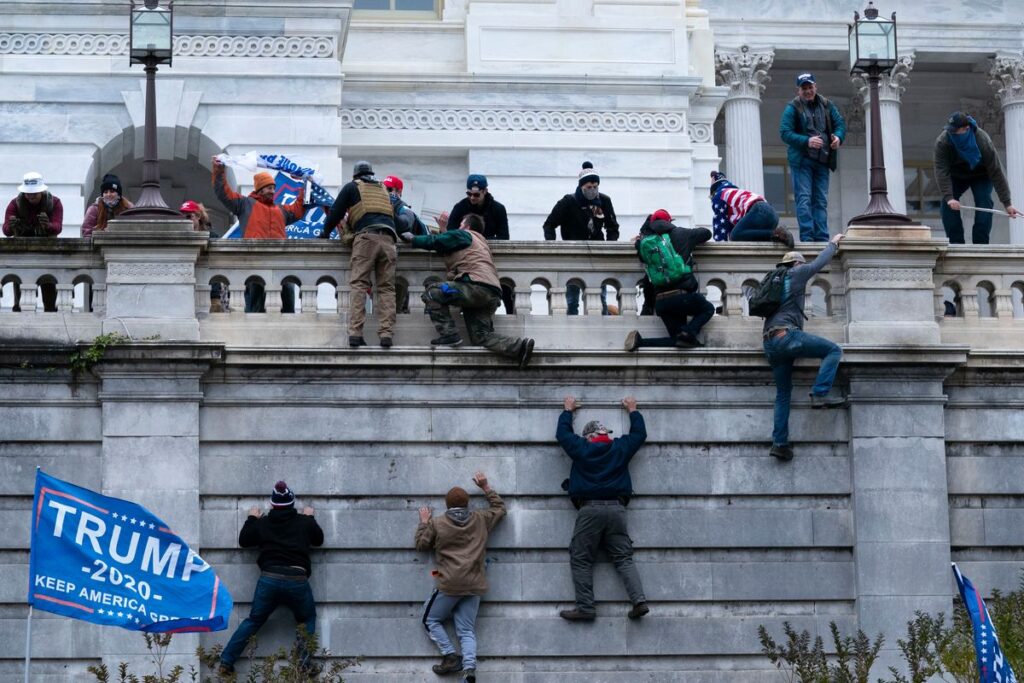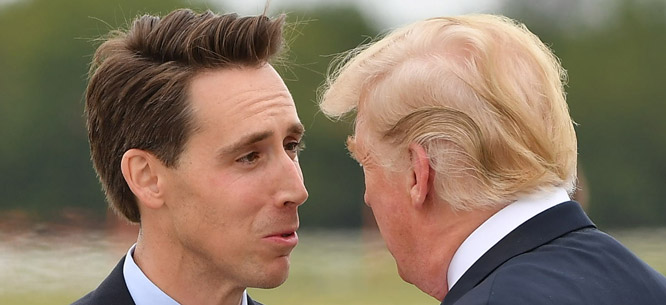Some Dare Call It Treason

With impeachment acquittal likely, there are other remedies to hold Trump accountable.
Impeachment
For those of you wishing upon a star that the vile optics of the Jan. 6 attack on our Capitol will provoke a sense of outrage and be the winning argument in Trump’s impeachment trial, I have a question for you: When did a Republican majority ever act in good faith and concede anything they didn’t have to (e.g. a government shutdown)?
I’ll throw out some names and events to refresh your memories: Obama’s “grand bargain.” The 2014 immigration bill. Background checks. Merrick Garland. Amy Coney Barrett. You get the picture.
And then there’s the recent 55-45 vote in the Senate to even go forward with the trial. That’s 45 Republican Senators agreeing with Sen. Rand Paul’s argument that it was “unconstitutional” to impeach a former president. For the record, the five principled Republican Senators voting to proceed were Lisa Murkowski of Alaska, Susan Collins of Maine, Mitt Romney of Utah, Patrick Toomey of Pennsylvania and Ben Sasse of Nebraska. Only Sasse, in my opinion, put his job on the line.
Sen. Paul declared victory after the vote, saying “45 votes means the impeachment trial is dead on arrival.”

Insurrection and a failed coup attempt. That is treason. And any people involved should be treated as such, including the [former] president.
Derrick Johnson, president of the NAACP
Biden’s Dilemma
Let’s be mindful of the fact that impeachment is a civil proceeding. A more substantive remedy for Jan. 6 would involve a criminal indictment initiated by the Department of Justice (DOJ).
Herein lies President Biden’s dilemma. Amid cries from Democratic officials to investigate and prosecute Trump, Biden must vigilant to restore certain democratic principles that were tested and abused over the past four years. Any restoration should include de-politicizing the DOJ and keeping it separate from the president’s agenda. Even given the audacity of of the insurrection, the optics of Biden using the DOJ against political opponents as Trump did perhaps steers the president’s caution.
And yet, the clamor to prosecute Trump persists. Even the most conservative Senator in the Democratic caucus, Joe Manchin (D-WV), endorses a “judicial path.”

Did Trump Commit Treason?
The US Constitution defines treason as one of two specific acts: “levying war” against the US government, or “adhering to their Enemies, giving them aid and comfort.” Fearing abuse of the charge of treason, our framers “gave treason a very narrow definition and made it extremely difficult to prove.”
Jeannie Suk Gerson, a Harvard law professor, wrote a Jan. 28 piece for the New Yorker magazine titled, “Did Trump and His Supporters Commit Treason?” that was so illuminating, she was interviewed on the MSNBC show All In with Chris Hayes. Here is that interview, five minutes long, published by Free and Fair Elections via YouTube:
Aaron Burr
The “high treason” trial of founding father Aaron Burr can hang a lantern on the obstacles to gaining a treason conviction. In 1807, the Jefferson administration prosecuted its former vice president for conspiring with a band of armed men to overthrow the US government outpost in New Orleans. The US Supreme Court ruled that the conspiracy did not rise to the level of “levying war.” Burr was acquitted.
Chief Justice John Marshall held that levying war required “the deployment of actual force” by “a warlike assemblage, carrying the appearance of force, and in a situation to practice hostility.” Well, let’s review: The invaders of Jan. 6 were certain “warlike,” carried the appearance of force and practiced hostility. Author Carlton Larson, who wrote a book “On Treason,” compared Marshall’s words and the aggression on Jan.6, and observed: “At some point, you have to say, if that’s not levying war against the United States, then what is?”
Trump’s leading role in the conspiracy is in bits and pieces: His damning speech to supporters before the carnage began, his “wild” tweet, his “stand by” statement to the Proud boys, his unwillingness to stop the insurrection, the security failure…the list is long. Still, history is on Trump’s side.
Seditious Conspiracy
Short of treason, there is a federal law that states that a person who incites “any rebellion or insurrection against the authority of the United States and the laws thereof…” has committed a felony and is disqualified from holding federal office.
To stymie Trump’s dream of a second term, this seems like a useful alternative to the high bar of 67 Senators voting affirmatively for impeachment.
Public Officials Behaving Badly
Another tool at the government’s disposal: Section 3 of the 14th Amendment prohibits public officials who swear an oath to the Constitution and have “engaged in insurrection or rebellion” against the United States from holding public office. The 14th Amendment was drafted three years after the Civil War; Section 3 primarily targeted confederate soldiers who had not yet accepted defeat.
Nevertheless, Section 3 can be useful to prosecute Congressmen who enabled the Jan. 6 violent attack and the events leading up to it. New Jersey Democratic Congressman Mikie Sherrill is on record as witnessing as of yet unnamed members of Congress who “had groups coming through the Capitol…on January 5, a reconnaissance for the next day.” Both the Capitol Police and the US Government Accountability Office have opened investigations.

The New York Times reported that conservative Trump enthusiast Rep. Scott Perry (R-PA) was involved in a failed plot to leverage the power of the department of justice to overturn the state of Georgia’s presidential election results. Perry’s method, spelled out it the graphic above, was confirmed by the Congressman himself.
Pennsylvania’s attorney general, Josh Shapiro, tweeted out the following: “Rep. Perry ought to familiarize himself with Section 3 of the 14th Amendment of our Constitution. There must be consequences for this conduct.”
Perry countered with the usual “concerns” about the integrity of our elections, blah, blah, blah. Constitutional experts interviewed by the Philadelphia Inquirer judged Perry’s conduct “reprehensible and dangerous,” but did not rise to the level of insurrection. A DOJ investigation continues.
Coda
Why go through this? Here’s a thought, from the executive director of MoveOn:
I think back to when I’m in therapy. My therapist says, What’s really important for healing is the acknowledgement that the injury to have actually happened by the perpetrator. We need people to own up, we need people to admit their lies. We need the truth to be known. Without that, healing is just repressing.
Rahna Epting, MoveOn



















































































































